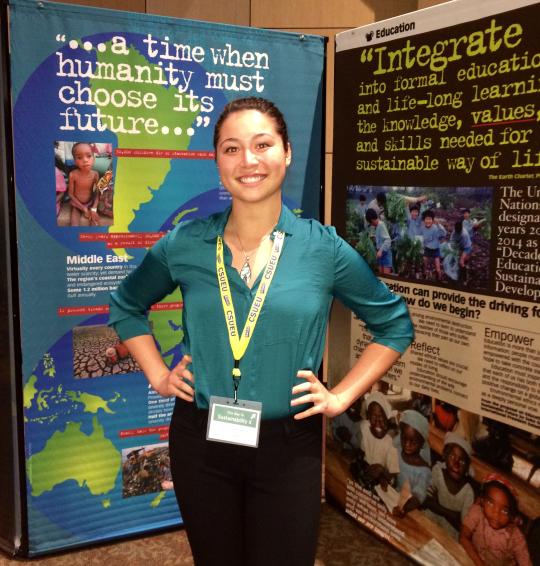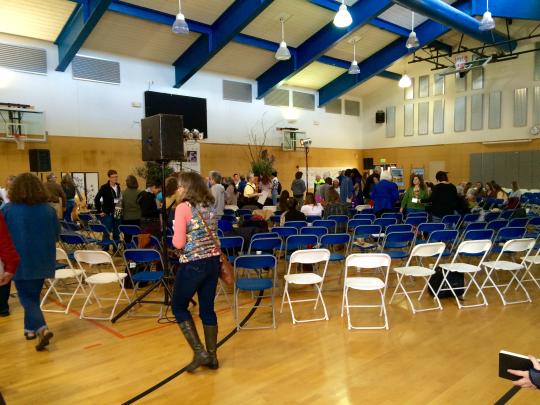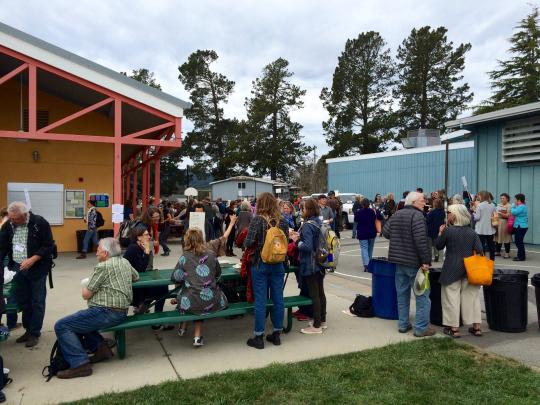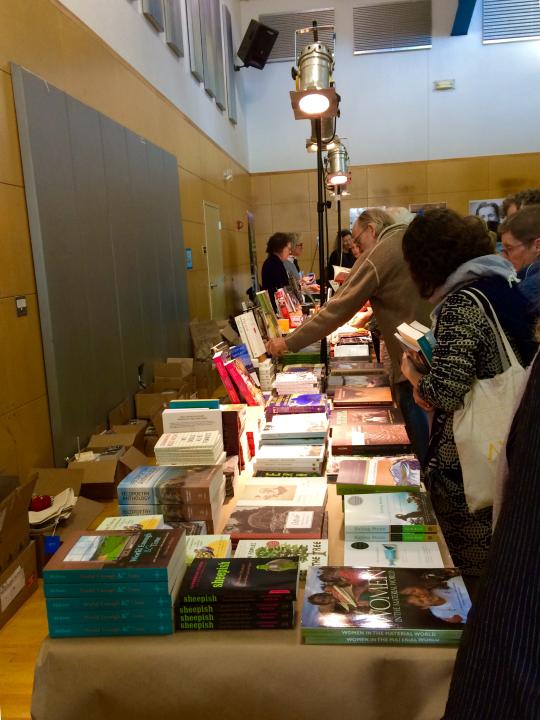Why I Was Proud to NOT Fit in at the Geography of Hope Conference: Women and the Land
As I get further into my education and dive deeper into the issues of society, I can't help but wonder what is at the root of all of these problems. Is it possible that all these issues could be related? I believe the answer is yes. At the heart of every problem we see today is at least one of two faults: lack of respect for others or lack of respect for the Earth. Hunger, pollution, racism, and greed all stem from the same disconnection between each other and the land we share.
We have asked everything of the Earth, but what does the Earth ask of us? This was the question that I asked myself at the Geography of Hope Conference, which was held at the West Marin School in Point Reyes. I would have been bitter for being trapped inside on such a beautiful day if the conference had not been such an empowering and spiritual atmosphere. I absolutely loved the way the conference presentations were set up. Every session had a panel of three or more writers and a mediator to steer the conversation. Each panel discussed a complex question such as "What does it mean to love a place, and what does the love require of us?". These writers were so articulate with their words that it was really quite amazing to hear them speak about their own research and experiences during the process of writing their books. Art is a wonderful way to unite people whether it be through music, dance, or literature, and I think environmentalists need to utilize this tool more. It is one thing to tell someone a fact and hope that they understand, but it if you involve someone in the lesson they will remember its relevance.This conference did a great job at incorporating singing, yoga, and an interactive art piece into the agenda.
I wish that all the lessons I learned that day were full of hope and inspiration, but unfortunately one was not. At lunchtime we broke up into small groups to eat together and have concentrated discussions. The mediator of our group started off the discussion by asking us to talk about anything that was on our minds, what we liked about the conference, and our concerns if we had any. When it came to my turn I talked about how all of us were at this conference because we already care about the future of the land and because we know the gravity of the issues our world is facing. My concern was that there was a lack of addressing how to reach out and educate our communities that don't necessarily feel a connection to the land, or have never appreciated the importance of the environment through their own experiences. I asked the group for feedback on how to communicate these ideas in a way that did not point out the flaws of others' daily routines, but instead encouraged them see the benefits of sustainable conscientiousness. To my surprise one of the women, who was actually one of the speakers of the conference, immediately responded to my question by criticizing my choice of words. I didn't know what to say so I sat back down feeling incredibly judged and misunderstood.
As it turned out most of the women in my group just wanted to talk about themselves and about how wonderful and hopeful their experiences have been. I was furious because not only was I sitting there feeling bad for bringing up the reality of our challenge, but more importantly I was not at this conference to boast about my accomplishments. I was there to gather insight and knowledge from passionate activists and to tackle the hard truth that not everyone understands their relationship to the land. Thankfully I found relief by talking to one of the women who too felt as if she was not given the time of day for being honest and admitting that she was finding it hard to be hopeful. We ended up talking for quite some time, and as it turns out she manages a wonderful non-profit that has had a huge impact on my life. Global Student Embassy (GSE), whose "mission is to develop community leaders through action oriented environmental education", is the organization that first opened my eyes to both environmental injustice and environmental activism. After my trips to Ecuador and Nicaragua I was able to realize the power I have as an individual to make change in this world, and I knew that I had to pursue a degree in Environmental Studies.
After talking with her, it occurred to me that the experience during lunch had happened for a reason. If I had not been shut out by the group I would have never bonded with this amazing woman! It is so defeating to be criticized and to feel unaccepted especially by people that you respect, but the reality is that being true to yourself is the only way you'll ever be proud at the end of the day. I am only stronger because of this experience and I know that everything that I am doing at school, at my job, and in my life is evidence of my love for this Earth and all the beings that we share ki with. [1]
We know that the indigenous cultures and first societies watched and learned from nature. At what point in history did we decide that we are more important, more intelligent, and somehow more deserving of Earth's blessings and resources than the other 8.7 million species on Earth? At what point did we decide to manipulate and destroy the natural systems that keep the Earth in balance? Unfortunately it doesn't really matter when we took the wrong turn, the issue now is that we have never gotten back on the right path.
It took going to a Geography of Hope conference for me to question my intentions, remember my purpose, and leave feeling my hope burning stronger than ever. This hope for the future cannot just come from environmentalists because they are not the only ones being affected by humanity's choices. We are all in this together whether we like it or not, and we must recognize that almost every aspect of society needs a major adjustment of how things are done. Change does not have to be scary, especially when it can only benefit us! It is not our way of life that we must save, it is our world that we must save from our way of life.
1. At the conference we talked about how wrong it is to objectify the Earth and the other beings of the Earth. Robin Wall Kimmerer suggested that we start using the words ki as a singular noun and kin for plural use when talking about our fellow creatures and the world. After all, you would never call your Grandmother "it" right? It is just as inappropriate to call the Earth "it" too.

Author: Claudia Sisomphou







